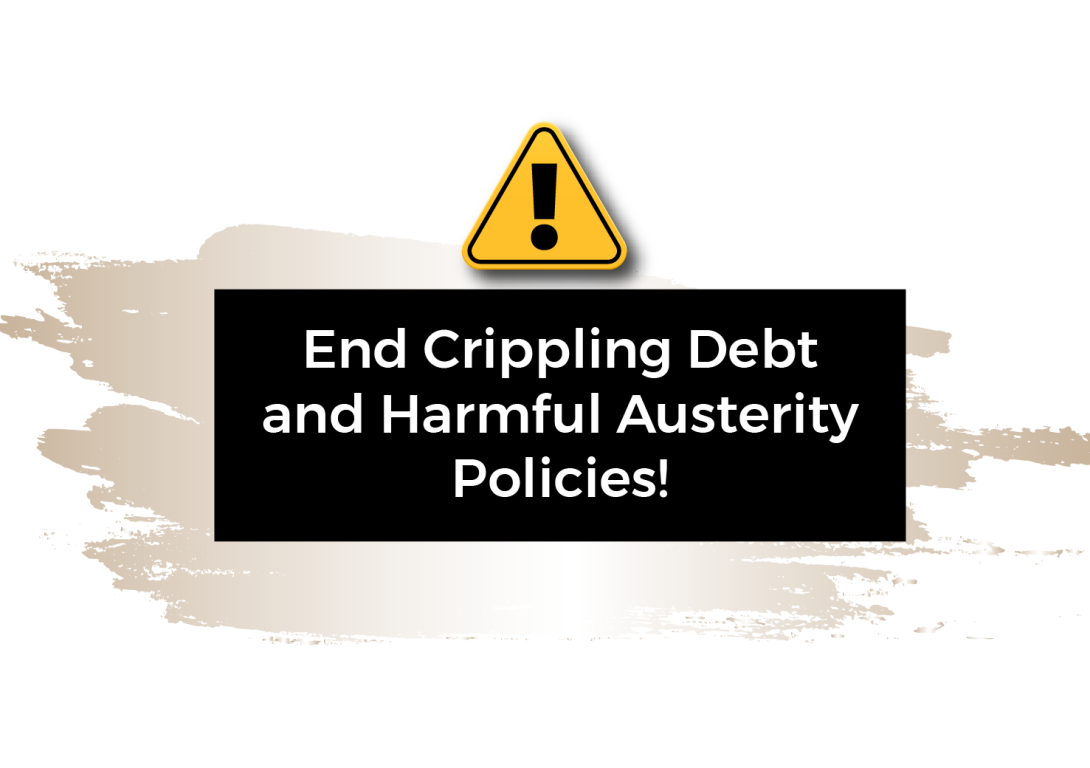Date
24 April 2025

PRESS RELEASE
IMF and World Bank Spring Meetings: AFRODAD and Partners Demand an End to Crippling Debt and Harmful Austerity Policies
[Harare, Zimbabwe. [April 24, 2025]: The week-long Spring Meetings, hosted by the International Monetary Fund (IMF) and the World Bank (WB), are taking place in Washington, DC, on 21- 26 April. Discussions will focus on “Bold strategies needed to rebuild resilience, revitalise policy space, and unlock new growth opportunities”. These meetings come at a time when recent global policy shifts, including abrupt changes in tariffs from the United States, are projected to slow down global growth significantly, reaching 2.8 percent and 3 percent in 2026; an aggregate downgrade of about 0.8 percent according to the IMF’s World Economic Outlook Report, April 2025. For many African countries, demand and prices for commodities that they rely on, such as oil and minerals, are likely to be hard hit. US tariffs threaten to disrupt Africa’s efforts to integrate back into the global value chains when the continent is still recovering from the COVID-19 pandemic and climate shocks that have greatly exacerbated its debt crisis. Further, the sweeping tariffs of up to 50% (in the case of Lesotho) targeting African countries will make African exports less competitive, particularly in the United States markets, stifling crucial revenue streams for governments already allocating more of their revenues to debt repayment
These new policies further complicate Africa’s struggles with debt that has increased to US$1.13 trillion, up from 100 million in the 1960s and 1970s, and 1.3 billion in the 1980s and 1990s. In 2023, a historic 54 developing nations, nearly half in Africa, dedicated at least 10% of government funds to debt interest payments; 130 million Africans live in countries that spend more on interest than on health and education. More concerning is that developing countries paid $847 billion in net interest in 2023, a 26% increase from 2021. Borrowing rates were 2 to 4 times higher than the US’ and 6 to 12 times higher than Germany's. But still, the IMF is encouraging most countries to implement austerity, thus, 43 African Union (AU) member states are cutting their spending by a cumulative 5.4% of GDP during 2021–26, totaling $183 billion. Egypt- the African country with the highest IMF loan of $9.3 billion recently received a $1.2 billion payout from the IMF as part of the $8 billion Extended Fund Facility (EFF) backed by austerity measures to address economic difficulties. Kenya, which holds the second-largest IMF loans on the continent, witnessed civil unrest led by GEN Zs as the government was forced to prioritise debt repayment over investing for the current and future generations.
The IMF & World Bank have been imposing harmful conditionalities that prioritise austerity over investment in people, violate human rights to health, education, and a decent life, disproportionately affect women, girls, and vulnerable groups, and fail to address structural causes of Africa's debt cycles. Over the last decades, most African countries have experienced a surge in sovereign debt levels, exacerbated by global economic shocks and limited access to international capital markets.
Forward looking
- AFRODAD advocates for concrete commitments towards an intergovernmental process on debt restructuring away from the creditor-dominated approaches that are at the heart of the recurrent indebtedness in Africa and the global South. It urges this process to be inclusive, transparent, and binding, ensuring equitable participation for debtor countries and civil society in shaping the terms of debt resolution
- AFRODAD and partners remain committed to advocating for the protection of social spending in all debt workouts with creditors. Any debt restructuring process should adhere to its vital role in human development and poverty reduction. We urge the creditor community to refrain from imposing austerity measures that disproportionately impact vulnerable populations and undermine progress towards the Sustainable Development Goals. This is the main reason why we champion alternative solutions that prioritise social investments and promote inclusive growth in African countries
- There is need to build consensus on improving the Debt Sustainability Framework (DSF) to have more African contextual dimensions, such as remittances and social spending. The current DSF often fails to adequately account for these factors, leading to inaccurate assessments of debt sustainability and inappropriate policy recommendations. We advocate for a revised framework that incorporates these African contextual dimensions, enabling more informed and equitable debt management decisions.
Fidélité Nshimiyimana, Campaigns & Communication Manager.
-END-
